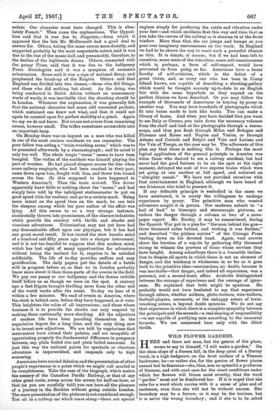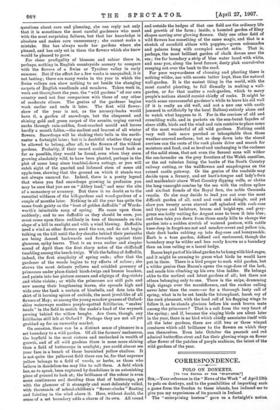WILD FLOWER GARDENS.
HERE and there not man, but the genius of the place, seems to say to himself, "I will make a garden." On the clean slope of a Sussex hill, in the deep quiet of a Surrey wood, in a high hedgerow, on the level surface of a Thames backwater, he—or rather she, for the genius of flower places cannot but be feminine—she, then, sets so splendid a profusion of blossom, and with such care for the exact conditions under which her flowers will bloom most sweetly, that the word "garden" must not be disallowed her. If it is urged that she asks for a word which carries with it a sense of plan and of enclosure, even then she will not be without excuse. Her boundary may be a furrow, or it may be the horizon, but it is never the wrong boundary ; and if she is to be asked
questions about care and planning, she can reply not only that it is sometimes the most careful gardeners who meet with the most surprising failures, but that her knowledge is absolute and makes care unnecessary ; she cannot make a mistake. She has always made her gardens where she pleased, and has only set in them the flowers which she knew would be pleased to grow.
For sheer prodigality of blossom and colour there is, perhaps, nothing in English countryside scenery to compare with the flowers of a Swiss or Tyrolese valley in early summer. Bnt if the effect for a few weeks is unequalled, it is not lasting; there are many weeks in the year in which the Swiss valleys can show nothing to set beside the changing carpets of English woodlands and meadows. Taken week in, week out throughout the year, the " wild gardens" of our own country need not fear comparison with those of any other of moderate climes. The genius of the gardener begins work earlier and ends it later. The first wild flower- show of the year is not, as the nursery-books would have it, a garden of snowdrops, but the chequered and shining gold and green carpet of the aconite, urging curved necks through rain-sodden, frost-cracked mould and leaves hardly a month fallen,—the earliest and bravest of all winter flowers. Snowdrops will be shaking their bells in the north- easter a fortnight later ; but it is doubtful whether they may be allowed to belong, after all, to the flowers of the wildest gardens. Probably, if their record could be traced back as far as possible, they would be found, even when they seem growing absolutely wild, to have been planted, perhaps in the plot of some long since tumbled-down cottage, or you will catch sight of the gnarled and lichened stem of some old apple-tree, showing that the ground on which it stands was not always uncured far. Indeed, there is a pretty legend that where you find snowdrops growing in profusion you may be sure that you are on "Abbey land," and near the site of a monastery or nunnery. But there is no doubt as to the essential wildness of the bill-gardens and wood-gardens of a couple of months later. Nothing in all the year has quite the same fresh gaiety as the "host of golden daffodils" of Words- worth's inimitable song of spring. He came upon them suddenly; and to see daffodils as they should be seen, you must come upon them suddenly in tens of thousands on the slope of a hill in sunlight and with a wind blowing. Daffodils need a wind as other flowers need the son, and do not begin talking on the hill until the dry sheaths behind their perianths are being danced backwards and forwards against their glaucous, spiky leaves. That is an even earlier and simpler sound of April than the first sharp notes of the chiffchaff tumbling among the beech-twigs. With the fading of daffodils, indeed, the first simplicity of spring ends ; after that the gardener of the woods begins to try effects of colour ; she strews the most delicate yellows and crinkled greenery of primroses under plum-tinted birch-twigs and bronze bracken, and paints into her picture corners and edgings of dog-violets and white violets ; or while the primroses are still pale and new among their lengthening leaves, she spreads high and wide over the bank a curtain of bluebells, and dots into the skirt of it burning spires of orchids, the most jewel-like of all flowers of May; or among the young meadow glasses of Oxford- shire waterways scatters purple-spotted fritillaries, "snakes' beads" in the field to match the snake's head of the wryneck peering behind the willow boughs. Are there, though, any fritillaries still left at Oxford ? Perhaps they are not all yet grubbed up for an unworthy market.
On occasion, there can be a distinct sense of pleasure in a set boundary to a wild garden. Of all the farmers' enclosures, the hayfield is the most riotous and unchecked in wealth of growth, and of all wild gardens there is none more shining than a field of buttercups in sunlight ; you could almost see your face in a bunch of those burnished yellow chalices. It is not quite the yellowest field there can be, for that supreme yellow belongs to a field of weeds, or herbs, as those who believe in dandelion-tea may like to call them. A field which has, so to speak, been captured by dandelions is an astonishing piece of ground to look at; the brilliance of the colour is even more continuous and dazzling than that of buttercups, yet with the glamour of it strangely and most delicately veiled, with thousands of school-children's "flower-clocks" floating and fainting in the wind above it. Here, without doubt, the sense of a set boundary adds a charm of its own. All round and outside the hedges of that one field are the ordinary life and growth of the farm ; inside, a haunted garden of filmy shapes moving over glowing flowers. Only one other field of wild flowers has something of the same magic, and that is a stretch of cornfield ablaze with poppies,—green colonnades and palaces hung with crumpled scarlet satin. That is, perhaps, the most brilliant garden of chalk downs near the sea; the far boundary a strip of blue water laced with white, and near you, along the level furrow, dusty pink convolvulus creeping out over the bank to the road.
For pure waywardness of choosing and planting there is nothing wilder, nor with secrets better kept, than the natural wall-garden. It is the easiest thing in the world, with the most careful planting, to fail dismally in making a wall- garden, or for that matter a rock-garden, which to many people's notions should consist chiefly of rocks. It might be worth some unsuccessful gardener's while to leave his old wall (if it is really an old wall, and not a new one with earth jammed in artificially by the local Balkan) entirely alone and to watch what happens to it. ' For in the crevices of old and crumbling walls, and in pockets on the sun-burnt façades of sheer cliffs, birds and the wind and rain contrive to place some of the most wonderful of all wild gardens. Nothing could very well look more parched or inhospitable than those weather-scarred surfaces; but so deep down into the stored crevices can the roots of the rock plants drive and search for moisture and food, and so level and unchanging is the coolness of the solid stone, that not even the fiercest suns will wither the sea-lavender on the grey frontiers of the Welsh coastline, or the red valerian lining the banks of the South Country railway cutting, or the wallflowers and snapdragons on the ruined castle gateway. Or the genius of the roadside may decide upon a fernery, and set hart's-tongue and lady's-fern and maidenhair above West Country dipping wells, or clothe the long unsought combes by the sea with the rufous spikes and six-foot fronds of the Royal fern, the noble Osniunda regalia. Or she may decide to lead you out over the most difficult garden of all, sand and rock and shingle, and yet show you twenty acres starred mill splashed with rock-rose and thyme and bedstraw, broom and bright-eye, and grey- green sea-holly waiting for August suns to burn it into blue; and then take you down from those sandy hills to change the garden into a sudden stretch of watered pasture, with cattle knee-deep in forget-me-not and meadow-sweet and yellow iris, their dark backs rubbing up into dog-rose and honeysuckle. Each is a true garden, defined and enclosured, though the boundary may be wilder and less easily known as a boundary than an iron railing or a laurel hedge.
Bacon kept part of his ideal garden to be bung with bird-cages, and it might be amusing to guess what birds lie would have put in them. There is a bird proper to each wild garden, but a wilder genius than Bacon's opens the cage-door of the lark, and sends him climbing up his own blue ladder. He belongs alike to the earliest and latest gardens of all; but there are others belonging only to one. There is the snipe, drumming high zigzags over the marsbflowers, and the cuckoo calling never later than the roses—or for a thorough lusty call of spring, what is to be set beside the triumphant, harsh cry of the cock pheasant, with the loud roll of his flapping wings to follow it, as he stands glorious before his meek brown mate among the primroses ? That is a call from the very heart of the spring ; and if, because the singing birds are silent later in the year, there is no bird which chiefly associates itself with all the later gardens, there are still two or three winged creatures which add brilliance to the flowers on which' they sun themselves. Even into October the peacock and red admiral butterflies strut and fan their glowing wings on flower after flower of the patches of purple scabious, the latest of the wild gardens of the year.



























































 Previous page
Previous page